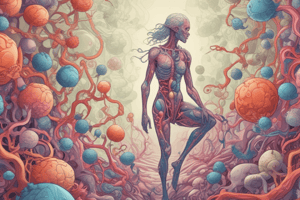Podcast
Questions and Answers
What are the key differences between prokaryotic and eukaryotic cells?
What are the key differences between prokaryotic and eukaryotic cells?
Prokaryotic cells lack a nucleus and membrane-bound organelles, while eukaryotic cells have a nucleus and various organelles.
Describe the main differences between plant cells and animal cells.
Describe the main differences between plant cells and animal cells.
Plant cells have a cell wall, chloroplasts, and large vacuoles, whereas animal cells have no cell wall and smaller vacuoles.
What role do stem cells play in biology?
What role do stem cells play in biology?
Stem cells have the ability to differentiate into various cell types and are essential for growth, repair, and regeneration of tissues.
What are the four stages of mitosis and a key event in each stage?
What are the four stages of mitosis and a key event in each stage?
Explain the differences in structure and function between arteries, veins, and capillaries.
Explain the differences in structure and function between arteries, veins, and capillaries.
What is the function of the sinoatrial (SA) node in the heart?
What is the function of the sinoatrial (SA) node in the heart?
Define diffusion and explain its importance in the respiratory system.
Define diffusion and explain its importance in the respiratory system.
What is peristalsis and where does it occur in the digestive system?
What is peristalsis and where does it occur in the digestive system?
Flashcards
Prokaryotic vs. Eukaryotic Cells
Prokaryotic vs. Eukaryotic Cells
Prokaryotic cells lack a nucleus and membrane-bound organelles, while eukaryotic cells have both.
Plant vs. Animal Cells
Plant vs. Animal Cells
Plant cells have cell walls and chloroplasts, while animal cells do not.
Mitosis Stages
Mitosis Stages
Mitosis is cell division where a single cell divides into two identical daughter cells. There are several phases: prophase, metaphase, anaphase, and telophase.
Cancer Cell
Cancer Cell
Signup and view all the flashcards
Arteries, Veins, Capillaries
Arteries, Veins, Capillaries
Signup and view all the flashcards
Circulatory Circuits
Circulatory Circuits
Signup and view all the flashcards
Respiratory Muscles
Respiratory Muscles
Signup and view all the flashcards
Digestion Types | Locations
Digestion Types | Locations
Signup and view all the flashcards
Study Notes
Cells and Organelles
- Compare prokaryotic and eukaryotic cells
- Compare plant and animal cells
- Describe the function of specific organelles
- Define stem cells
- Outline the structural hierarchy (Cells > Tissues > Organs > Organ Systems > Organism)
Mitosis and Cell Division
- Recognize the stages of mitosis (Interphase, Prophase, Metaphase, Anaphase, Telophase)
- Understand important events at each stage
- Define cancer and describe characteristics of cancerous cells
Circulatory System
- Compare arteries, veins, and capillaries (structure and blood flow direction)
- Explain the two circulatory circuits and blood oxygenation in each
- Describe the heart's control by the sinoatrial (SA) node
Nervous System
- Identify components of the central nervous system
- Identify components of the peripheral nervous system
- Define the autonomic nervous system
- Describe the functions of the sympathetic and parasympathetic nervous systems
Respiratory System
- Label respiratory structures (Mouth, Trachea, Bronchus, Bronchi, Bronchioles)
- Explain the function of the nose in respiration
Digestive System
- Describe the two types of digestion and their locations
- Explain peristalsis
- Identify the type of acid in the stomach and its location
- Explain the function of the pancreas
- Relate villi to digestion and their location
- Explain the function of the large intestine
- Explain the role of diffusion in the digestive system
Plants
- Identify important plant structures and their functions
- Differentiate between xylem and phloem
- Describe stomata
- Explain where plants create energy
Studying That Suits You
Use AI to generate personalized quizzes and flashcards to suit your learning preferences.




